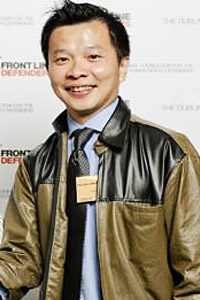
Prof Vitit Muntarbhorn's appointment by the UN Human Rights Council (UNHRC) as the first Independent Expert on protection against violence and discrimination based on sexual orientation and gender identity (SOGI) has rightly won worldwide praise, not least in his home country, Thailand. Considering how contentious the establishment of this new position was, his extensive qualifications in international law and unmatched experience in navigating UN human rights spaces will be invaluable in advancing SOGI human rights issues through uncharted waters.
In addition to systematic monitoring and regular reporting on violence and discrimination against lesbian, gay, bisexual, transgender and intersex (LGBTI) people worldwide, his role will bring much needed attention to the situation of LGBTs in Asia, which contrary to popular perception, have lagged behind Latin America and even Africa in recent years.
While homophobic laws in Uganda and Nigeria may have attracted worldwide attention, good progress was made elsewhere on the same continent. In fact, the first UNHRC resolution on SOGI was tabled by South Africa in June 2011. Soon after, Sao Tome and Principe and Lesotho decriminalised homosexuality in 2012, Mozambique in 2015, and the Seychelles earlier this year. In 2014, the African Commission on Human and People's Rights adopted an historic resolution protecting people from violence on the basis of sexual orientation and gender identity.
The second and third UNHRC's SOGI resolution in June 2014 and September 2016 -- the latter of which established Prof Vitit's position -- were led by a group of Latin American countries which have made even greater strides in LGBTI rights. Their Inter-American Commission of Human Rights had established a similar position in 2013, after setting up an LGBT dedicated unit in 2011. Argentina, Brazil, Uruguay and Colombia enacted marriage equality between 2010 and 2016, and Argentina's Gender Recognition Law, considered among the world's best, allows transgenders to change their legal genders solely on the basis of self-identification. Most recently, Belize's Supreme Court also struck down the colonial sodomy law.
And of course, there is the most successful European Human Rights System which pioneered SOGI rights in the 1980s, a full decade before the first SOGI case, known as Toonen v Australia, reached the UN human rights system.
In the meantime, Asia can only boast of limited and fragmentary progress, even though it is the birthplace of the Yogyakarta Principles on the application of international human rights law in relation to SOGI whose drafting process Prof Vitit co-chaired 10 years ago. Among the 72 countries that criminalise same-sex sexual relations around the world, 23 are in Asia and six in the Pacific. Out of 13 which punish such relations with death, nine are in Asia. India decriminalised homosexuality in 2009 only to recriminalise it four years later.
While marriage equality efforts in Taiwan, Nepal and Vietnam have stalled, major backsliding happened this year, as political leaders in previously tolerant Indonesia began to treat LGBTIs as social threats, and gay men in Bangladesh have been targeted by religious extremists. To make it worse, Asia -- unlike other continents -- lacks effective national human rights institutions and regional human rights mechanisms. Even the closest to one, the Asean Intergovernmental Commission on Human Rights, continues to exclude SOGI in its mandate. With most Asian governments' pervasive aversion to human rights, Asia is clearly the largest human rights gaps to be filled.
Unfortunately, this also means that Asian LGBTIs' recourse to violence and human rights violations by state actors is only available through the UN human rights system -- with its own disconnect and barriers to accessibility. It is, therefore, hopeful Prof Vitit will provide a timely much-needed connections between Asian LGBTI civil society groups and the international human rights spaces especially in emergency situations, as well as rigorous support in combating violence and discrimination, especially in government policies.
As for Thailand, Prof Vitit is hoped to shed light on the actual situations of LGBTI Thais including many overlooked issues such as violence, poverty, substandard health services, and discrimination in education and employment among others. Even "sexier" government initiatives such as the Gender Equality law, and the proposed bills on same-sex partnership and gender recognition, as well as "LGBTI prisons" -- recently proposed by the Justice Ministry -- should be subject to a closer scrutiny to ensure civil society is consulted, that they are effective, and accord full respect to human rights and dignity -- rather than being implemented out of the usual misguided "good intentions", order enforcement or an erroneous notion of "separate but equal".
Paisarn Likhitpreechakul is a board member of the Foundation for SOGI Rights and Justice.
